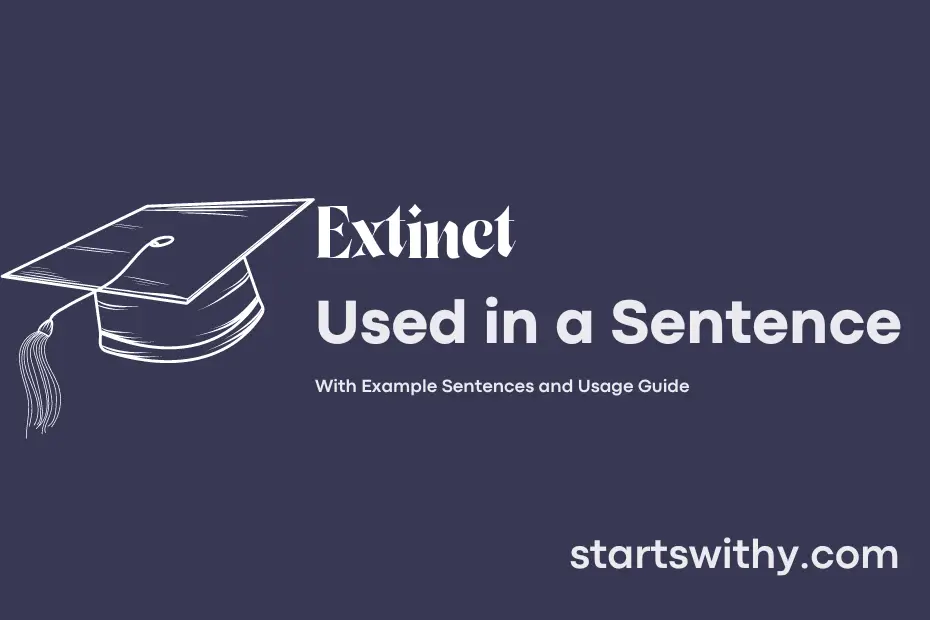Have you ever wondered what it means when a species is considered “extinct”? The term “extinct” is used to describe a plant or animal species that no longer exists on Earth. This can happen due to various reasons, such as environmental changes, natural disasters, or human activities.
When a species is declared extinct, it signifies that there are no more individuals of that species left in the world. This loss not only affects the biodiversity of our planet but can also have cascading effects on the ecosystem. Protecting and preserving endangered species is crucial to prevent more animals and plants from becoming extinct in the future.
7 Examples Of Extinct Used In a Sentence For Kids
- Dinosaurs are now extinct.
- The dodo bird is extinct.
- We need to protect animals from becoming extinct.
- The woolly mammoth is an extinct animal.
- Some plants are extinct too.
- Extinct means no longer alive.
- Let’s learn about extinct animals.
14 Sentences with Extinct Examples
- Extinct species of animals and plants often serve as important case studies in biology classes.
- Learning about extinct civilizations can provide valuable insights into the history and development of human societies.
- Understanding the factors that lead to a species becoming extinct is crucial for conservation efforts.
- Fossil records can help scientists piece together the story of extinct species.
- Studying extinct languages can offer unique perspectives on linguistic evolution.
- Some college students may dream of discovering the remains of an extinct species on a paleontological dig.
- Discussing the impact of human activities on causing species to go extinct is a common topic in environmental science courses.
- The importance of protecting endangered species from becoming extinct is often highlighted in biology lectures.
- Extinct species can still have a significant influence on modern ecosystems through their adaptations and interactions.
- Recognizing the signs of a species on the brink of going extinct is crucial for effective conservation strategies.
- Bringing back extinct species through cloning or genetic engineering is a topic of ethical debate in the scientific community.
- Exploring the reasons behind why certain civilizations thrived while others went extinct can provide valuable lessons for modern societies.
- Unearthing the remains of an extinct species can offer valuable insights into their behavior and dietary habits.
- Analyzing the impact of climate change on driving species to go extinct is a pressing issue for many college students studying ecology.
How To Use Extinct in Sentences?
To use the word “Extinct” in a sentence, you can follow these simple steps:
-
Understand the meaning: First, it’s important to know that the word “Extinct” is used to describe something that no longer exists or is no longer in existence. This could refer to a species of animal that has completely died out, a language that is no longer spoken, or a custom that is no longer practiced.
-
Choose your subject: Decide what you want to describe as extinct in your sentence. This could be a particular animal, plant, culture, or even a concept.
-
Construct your sentence: Once you have your subject, construct a sentence using the word “Extinct” to describe it. For example, “The Dodo bird is now extinct due to overhunting.”
-
Check for comprehension: Make sure that your sentence clearly conveys the meaning of something that no longer exists. It should be easy for others to understand what you are trying to say.
-
Practice: To get more comfortable with using the word “Extinct” in a sentence, try coming up with a few more examples on your own. This will help reinforce your understanding of the word and how to use it effectively.
By following these steps, you will be able to confidently use the word “Extinct” in a sentence and effectively communicate the concept of something that is no longer in existence.
Conclusion
In conclusion, the examples of sentences featuring the keyword “extinct” highlight the disappearance of various species from the Earth due to factors like habitat destruction and climate change. These sentences serve as a reminder of the irreversible consequences of human actions on the planet’s biodiversity. Understanding the impact of these sentences can underscore the importance of conservation efforts to prevent more species from becoming extinct in the future.
By reflecting on the fate of species mentioned in sentences with the word “extinct,” we can appreciate the urgency of protecting Earth’s delicate ecosystems. It is crucial that we prioritize sustainable practices and conservation measures to mitigate further loss of biodiversity and preserve the natural world for future generations to enjoy.



